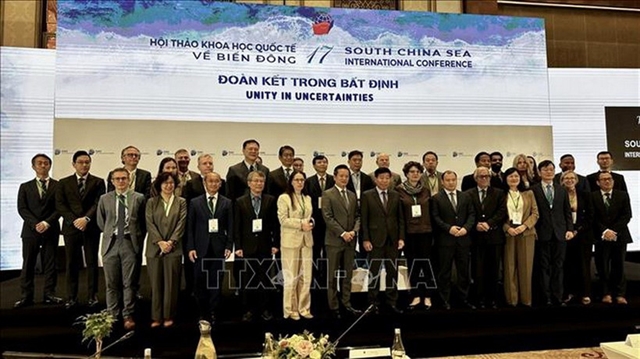 Politics & Law
Politics & Law

 |
| Delegates at the 17th international conference on the East Sea in Đà Nẵng. — VNA/VNS Photo |
ĐÀ NẴNG — The 17th international conference on the East Sea (internationally known as South China Sea) concluded on Tuesday in the central city of Đà Nẵng after two days of discussions focusing on ASEAN’s role and the significance of the 1982 United Nations Convention on the Law of the Sea (UNCLOS).
The event also featured two special sessions – an ambassadors’ lounge and a session on youth power – offering diverse perspectives on regional developments and exploring innovative ideas to safeguard peace and maintain a rules-based order in the East Sea.
In his keynote remarks, Australian Assistant Minister for Immigration and Assistant Minister for Foreign Affairs and Trade Matt Thistlethwaite underlined the crucial role of UNCLOS in maintaining peace, stability and the peaceful settlement of international disputes. He stressed that adherence to international maritime law is essential for economic security and shared prosperity, reaffirming Australia’s commitment to upholding global rules and institutions amid an increasingly complex world order.
During the ambassadors’ lounge, representatives from the European Union, Canada, Germany, Japan and Việt Nam emphasised the East Sea’s strategic importance and agreed that maintaining peace and stability in the area is a shared responsibility of the international community.
They underscored that international law, particularly UNCLOS, provides the foundation and the only viable pathway for resolving maritime issues. Non-regional partners were urged to fulfil their commitments through concrete actions, including ensuring freedom of navigation, enhancing multilateral diplomacy, and fostering international cooperation on sustainable blue economy initiatives.
Participants acknowledged ASEAN’s central role in shaping regional discussions on the East Sea but noted that the bloc faces growing challenges amid major-power competition. Internal differences and external pressure have at times hindered ASEAN consensus on key security matters, they said.
Some delegates observed that dispute settlement mechanisms under the Treaty of Amity and Cooperation (TAC) remain largely symbolic, while the 2002 Declaration on the Conduct of Parties in the East Sea (DOC) lacks effective enforcement and oversight. Negotiations on a Code of Conduct in the East Sea (COC) have proven difficult due to divergent views among parties on its legal nature and scope of application.
On UNCLOS, most experts reaffirmed its status as the “Constitution of the Oceans”, forming a comprehensive legal framework for all maritime activities and providing a foundation to address emerging challenges such as climate change and rising sea levels.
However, they warned that certain actors have sought to misinterpret or misuse UNCLOS provisions to advance unilateral claims, while rapid technological advances and shifting natural conditions are creating new legal complexities.
Scholars proposed various measures to reinforce peace and maritime order, calling on ASEAN to strengthen internal unity, enhance collective capacity, and expand cooperation with external partners and multilateral mechanisms.
They also recommended improving transparency, dialogue and information-sharing to build trust and establish early-warning systems to prevent conflicts.
At the closing session, Dr Nguyễn Hùng Sơn, director of the Diplomatic Academy of Vietnam, noted that the exchanges helped clarify the regional landscape, the roles of key stakeholders, and the implications of emerging technologies such as marine automation and artificial intelligence for maritime security.
Sơn emphasised that in an increasingly uncertain global and regional environment, countries must continue dialogue, information exchange and capacity building to reinforce unity and solidarity.
The conference, he said, generated valuable ideas to strengthen ASEAN’s centrality and ensure the effective implementation of UNCLOS – a cornerstone for peace, stability and sustainable development in the region. — VNA/VNS